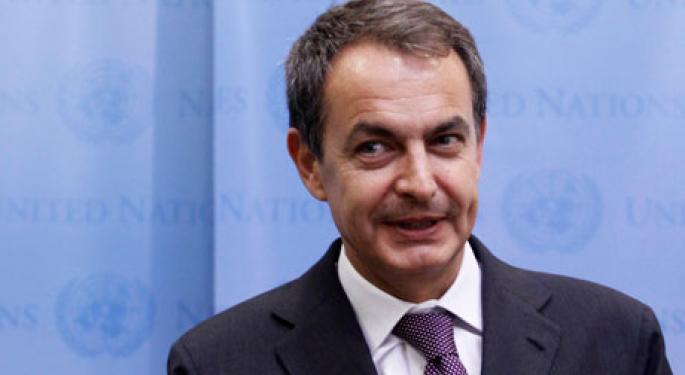Spain's Zapatero Claims Debt Crisis Over, But Is It?
The European debt crisis is over, according to Spanish Prime Minister Jose Luis Rodriguez Zapatero in an interview with the Wall Street Journal.
Spain has been one of the countries hardest hit by the sovereign debt crisis in the Eurozone, along with other nations such as Greece, Italy, and Ireland. To avoid the bailout that Greece is facing, the Spanish government has sought austerity measures and economic reform. Zapatero's upcoming budget proposal is said to cut the deficit gap to 6% next year and 3% after that. Currently it is forecast to be at 9.3% for 2010.
Zapatero said that further convergence beyond simply having one currency and monetary policy is not enough.
“We require further convergence to boost competitiveness,” said Zapatero. “And stronger principles to implement balanced economic and fiscal policies.” Indeed, the Spanish banking system has reduced their reliance on the European Central Bank, but a stubborn 20% unemployment rate has slowed economic growth in the country.
Zapatero's pronouncements may be premature, however, as other countries such as Great Britain are facing looming debt problems of their own.
The European Union has a limit on government deficits compared to GDP of 3%, which Spain has passed by at 11.2% in 2009. By comparison, Ireland's was 14.3%, Britain had 12.6%, and Portugal had a 9.4% deficit. Greece, which did require assistance from other European countries, had a 12.7% deficit ratio in 2009.
The new UK government, led by Prime Minister David Cameron, has pledged to rein in their budget through austerity measures, despite the slowdown effect it could have on the economic recovery there.
However, experts seem to feel that at the least, Ireland, the most likely to follow in Greece's footsteps, has worked to get its problems under control after the property market collapsed there. Despite this, there is still a possibility that Ireland will require financial assistance to get through its economic problems.
As much as Zapatero would like to deny it, the European Union is still facing shaky days going forward that will challenge the economic alliance's policies and unity.
© 2025 Benzinga.com. Benzinga does not provide investment advice. All rights reserved.
Posted-In: Britain David CameronNews Politics Global Economics Markets General



